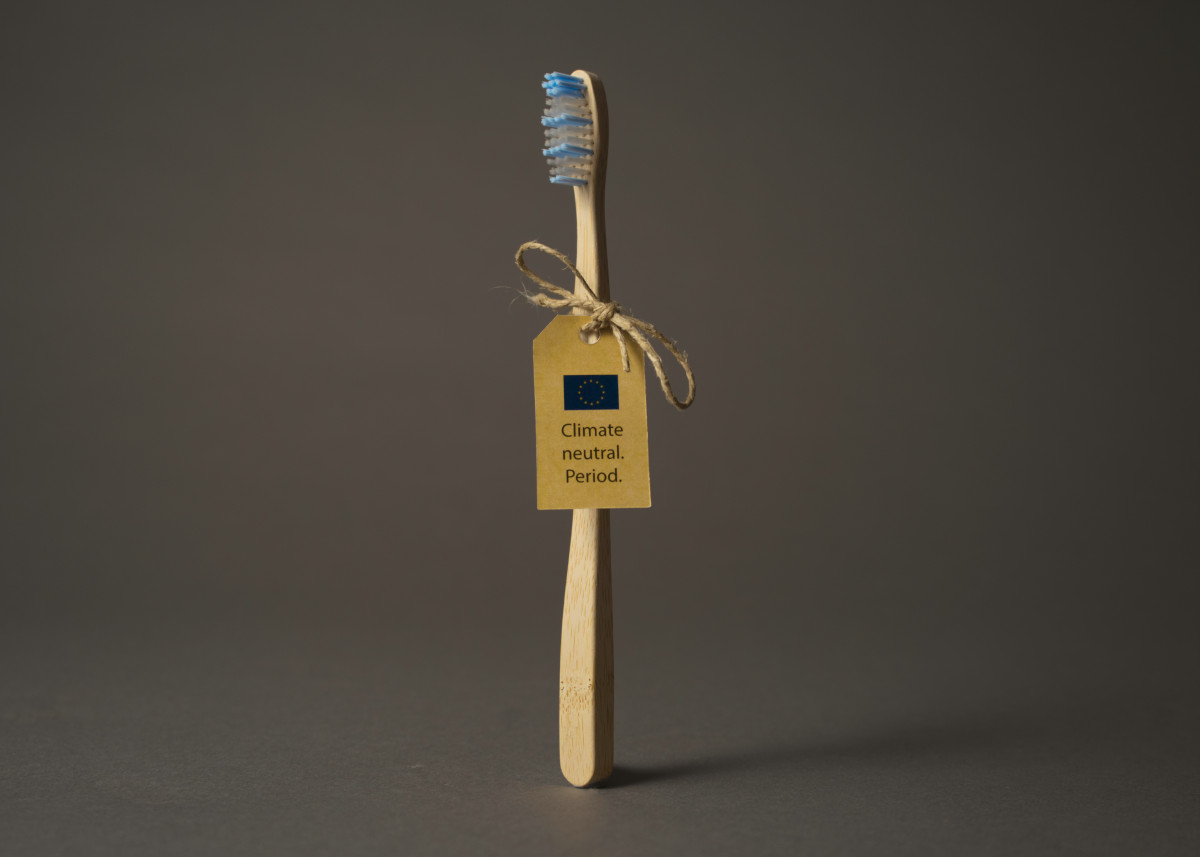EU proposal on green claims to massively impact ecolabels – NGO
*** Please note: This interview is part of the CLEW focus on company climate claims. This dossier lists our existing publications and future content plans. Other journalists can also get involved - Find out more here. Our upcoming events and opportunities are here. This blog explains why we decided to launch the project. ***
ECOS, Environmental Coalition on Standards, is an international NGO with a network of members and experts advocating for environmentally friendly technical standards, policies and laws.
Clean Energy Wire: What is the issue that the European Commission is trying to address with the “substantiating green claims” initiative?
Margaux Le Gallou: In Europe and globally, the number of claims companies make on the environmental performance of their products and activities is increasing. We are talking about sustainable products and processes, or carbon neutral packaging, for example. Showcasing environmental footprint has become a marketing strategy.
These claims must be regulated and the rules have to be clear about what can or cannot be claimed. Today, it is often the companies themselves which put together the environmental information available to consumers. These range from robust claims backed up by legislation to a variety of unsubstantiated, vague, irrelevant, misleading or even factually wrong information.
Is this where the new initiative comes in?
Yes, this is what the European Commission is trying to address, through two initiatives actually. First, the Empowering Consumers in the Green Transition Directive, which reforms consumer rules, listing what is forbidden. The proposal was published in March 2022. The key asset of this revision is a clear ban on generic and unsubstantiated terms. Companies will have to specify, for example, what makes their products or activities carbon-neutral.
Then, to complement this, there is the initiative on Substantiating Green Claims, also dubbed the Green Claims Directive, which is expected to be proposed by the European Commission next week. This one will address the other side of the problem: how to make a green claim the right way, providing more information on what methodologies should be used and which information provided.
The EU is also drafting specifications on how member states should enforce these rules, with no guarantee of effect, unfortunately.
Could you give some examples of green claims a company might make?
‘My product is carbon-neutral’, or ‘my packaging is reusable’, or ‘I’m plastic-free’… But what does it mean, really? Are the environmental impacts really lower or is this just a marketing strategy? We believe claims should be made on the whole product lifecycle, allowing buyers – be they consumers or companies – to compare the true environmental impacts of products and activities. And this is something that we expect from this Green Claims Directive.
The EU already has a method to do so - the Product Environmental Footprint [PEF] method, which covers 16 categories of impact, including carbon emissions, health impact or water pollution. This lifecycle assessment method is quite prescriptive in the sense that it does not allow you to cherry pick which impacts you want to look at and mention in your claims.
Unfortunately, it seems like the legislation is not going to be prescriptive on what exact method should be used, and notably will not make the use of the PEF method mandatory when assessing lifecycle impacts. That would be a missed opportunity.
What is the situation today? Could a company just put a “climate-neutral” toothbrush on supermarket shelves without any facts to back that up, or any kind of regulatory oversight?
Pretty much, yes. Today, companies can call their products ‘carbon-neutral’ and provide no further information. Someone could challenge this claim and notify the consumer or market surveillance authority. Then it would be up to the national authority to decide to launch an inquiry to check whether the product really is carbon-neutral. National market surveillance budgets to do these checks are overall very insufficient across the EU, and penalties very rare. Some call it the Wild West of climate neutrality claims.
The Empowering Consumers Directive and the Green Claims Directive will set out the rules, but the market surveillance question still has to be addressed.
In your view, what are the crucial problems in the draft versions of the Green Claims Directive?
There are three main things. First, the EU doesn’t seem to be on the way of banning climate neutrality claims, quite the contrary, actually. We firmly believe that a company should not be allowed to use offsets to claim carbon neutrality of its products.
But the Commission, instead of banning these deceiving practices, is working on a framework for carbon removal certification. We are concerned this could mean that the EU authorises companies to claim they have carbon-neutral products if they offset emissions following the approach defined in this new certification framework. We are very much against this.
Secondly, the Commission is set to give the Product Environmental Footprint [PEF] a key role in this. The problem is that the way the more specific rules for each product category are being developed is neither inclusive nor controlled enough, and are for now heavily influenced by industry and private interests.
What we would like to see in the green claims legislation is a governance framework on how you make the PEF system more democratic, transparent and balanced.
The third point is that PEF covers a lot of impacts, but it doesn’t cover all environmental claims. Biodiversity is very poorly covered, microplastics are not covered, neither are good things, such as reusability. It means it will not be enough to frame how all types of environmental claims are made, despite the importance of framing these practices as we have discussed.
Today, the companies bringing real change often do not get recognition.
It is very, very difficult to produce a truly climate-neutral product today, but there will be such products in the future. Should companies not be allowed to make justified claims in that case?
Here, you are talking about either a very distant future, or about very niche products. If you want to address most products in the world we live in today, climate-neutral without offsetting just doesn’t exist. The framing of “carbon neutrality,” especially when it comes to products, is just not helpful. The little gain that truly climate-neutral products would get from such claims is nothing compared to the problem a narrative on “neutrality” creates.
We already see the idea expanding to “plastic neutrality,” “nature positive,” where they say “we have produced plastic, but we have paid for beach clean-up projects, so we are neutral.” We really want to stop this narrative. There are other ways of talking about the good things a company is doing, including contribution to nature restoration, which are much more effective and reliable.
There is a lot of negative talk of greenwashing, but less positive talk about the potentials of having green claims. Are you generally in favour of such claims?
Absolutely, yes. The interesting thing when it comes to this legislation is that you have companies that would like to report their progress and they don’t know how to do it properly, or they are encouraged to use marketing strategies that are not good, like “climate-neutral.”
Labelling, scoring, and green claims are very powerful tools to drive the market. But there is a role for decision makers to play in regulating the practices, the way they already do with Energy Labelling, for example.
The idea with this legislation is to ensure that reliable claims get the visibility they deserve so that these products actually stand out. Today, the companies bringing real change often do not get recognition.
Which products would the green claims directive cover?
All products sold to consumers in the EU, also imported products. The potential is big!
The legislation will also massively impact certification schemes and other labels. The rules will change for an organisation creating an ecolabel, and the same will apply to certification schemes. What we want is clear rules on what certification schemes should cover, the processes, how inclusive they should be, how open and transparent.
What do you think the legislation could change? Is it good enough to make a difference?
I think the legislation is needed and has the potential to make a lot of difference if it is ambitious enough. But we have to wait for the final version, once the European Parliament and the member states also share their visions. Hopefully they’ll see consumer protection and creating a level playing field as key priorities.
So far and based on drafts, what we can expect are a lot fewer claims, because a lot of these unsubstantiated claims will be banned, which is already major progress. We will see more specific claims with actual numbers, links to more information, for instance using a QR code. Part of the claims will also become more comparable, because the legislation stipulates which methodologies to use.
What about enforcement? Who would do it and how?
For now, enforcement is with the national authorities.
We would like to see a system at EU level for third parties to approve methodologies, to approve claims, to approve certification schemes. If this is only done relying on member states, it means that different countries will come up with different rules, approaches, sanctions and ultimately very different outcomes.



